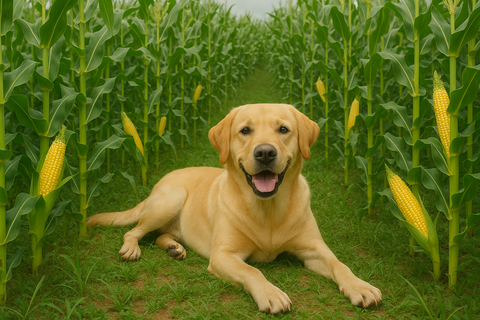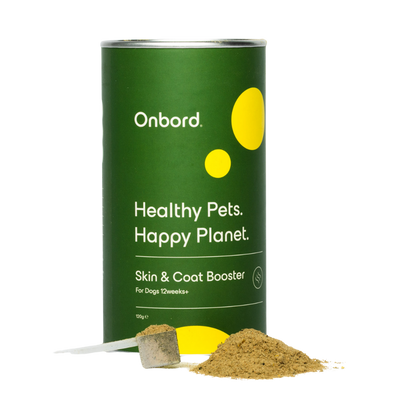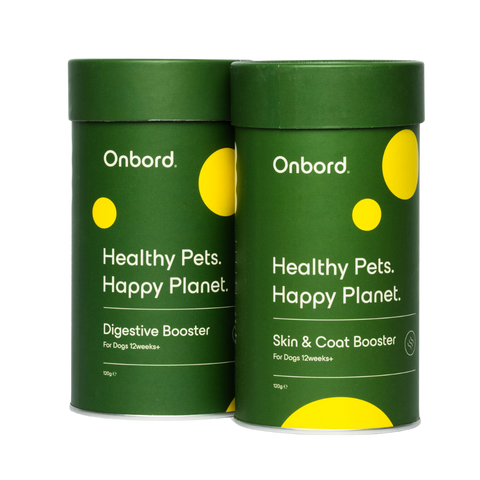Can Dogs Eat Sweetcorn? A Complete Guide for Dog Owners
Sweetcorn is a summertime staple for many households—but if you’re a dog owner, you may have wondered: can dogs eat sweetcorn? The short answer is yes, dogs can eat sweetcorn—but with some important caveats.
In this guide, we’ll break down everything you need to know about feeding sweetcorn to your dog, including the benefits, risks, how to serve it safely, and what to avoid.
Is Sweetcorn Safe for Dogs?
Yes, sweetcorn is generally safe for dogs to eat in moderation, as long as it's removed from the cob. The kernels themselves are not toxic and can even provide nutritional benefits. However, the corn cob poses a serious choking hazard and can cause dangerous intestinal blockages.
Nutritional Benefits of Sweetcorn for Dogs
Sweetcorn is more than just a tasty snack—it offers a range of nutrients that can support your dog’s health:
- Fibre – Aids digestion and helps with bowel regularity as a dog digestive booster.
- Carbohydrates – Provide a quick energy boost.
- Vitamins – Contains B-complex vitamins like folate, thiamine, and niacin.
- Antioxidants – Carotenoids like lutein and zeaxanthin support eye health.
While dogs don't require carbohydrates like humans do, small amounts of sweetcorn can add variety and nutrients to their diet.
Risks of Feeding Dogs Sweetcorn
Even though sweetcorn kernels are safe, there are several potential risks to be aware of:
1. Corn Cobs Are Dangerous
Never give your dog a corn cob. Dogs can’t digest the cob, and it often leads to choking or intestinal blockages—conditions that may require emergency surgery.
2. Seasonings and Additives
Avoid serving your dog corn that’s been seasoned with salt, butter, garlic, or onions, all of which can be harmful. Keep it plain and simple.
3. Allergies or Sensitivities
Though rare, some dogs may be allergic to corn. Watch for symptoms like itching, ear infections, or gastrointestinal upset.
How to Serve Sweetcorn to Your Dog
If you want to safely share sweetcorn with your dog, follow these guidelines:
- ✅ Cook it plain – Boiled or steamed sweetcorn is best.
- ✅ Remove it from the cob – Only serve the loose kernels.
- ✅ Serve in small amounts – Start with a teaspoon or two, especially if it’s your dog’s first time.
- ✅ Monitor for reactions – Keep an eye out for any unusual symptoms.
Can Dogs Eat Canned or Frozen Sweetcorn?
Canned Sweetcorn
Be cautious—most canned corn contains added sodium or preservatives that aren't good for dogs. If using canned, rinse it thoroughly before serving.
Frozen Sweetcorn
Frozen corn (plain and unseasoned) is a safer option and can be served cooked or defrosted. Just avoid any that’s pre-seasoned or mixed with other ingredients.
How Much Sweetcorn Can Dogs Eat?
Sweetcorn should be treated as an occasional treat, not a dietary staple. Here’s a rough guideline by size:
- Small dogs: 1–2 teaspoons
- Medium dogs: 1–2 tablespoons
- Large dogs: Up to 1/4 cup
Too much corn can cause digestive issues or contribute to weight gain, especially in sedentary dogs.
Signs Your Dog Shouldn’t Eat Corn
If your dog shows any of the following symptoms after eating sweetcorn, stop feeding it and consult your vet:
- Vomiting or diarrhea
- Excessive scratching or licking
- Signs of bloating or discomfort
- Lethargy or restlessness
Verdict: Can Dogs Eat Sweetcorn?
Yes, dogs can eat sweetcorn in moderation, as long as it’s off the cob and unseasoned. It can offer some nutritional perks and make for a fun, crunchy treat. But always be cautious, especially with portion size and preparation.
When in doubt, consult your veterinarian before introducing any new food into your dog’s diet.
Vitamins that are in sweetcorn that are good for dogs that can be used hand in hand with vitamin supplements for dogs.
Vitamin B1 (Thiamine) supports nerve function and helps your dog’s body convert food into energy.
Vitamin B5 (Pantothenic Acid) plays a role in hormone production and the metabolism of fats and proteins.
Vitamin B6 (Pyridoxine) is essential for brain development, red blood cell production, and proper nervous system function.
Vitamin B9 (Folate) aids in DNA synthesis and supports cell growth and tissue repair.
Vitamin C acts as an antioxidant that supports the immune system and can help reduce inflammation, especially during stress or illness.
Vitamin E promotes a healthy skin and coat while also contributing to immune function and cell health.
Vitamin A (as carotenoids like lutein and zeaxanthin) benefits eye health and immune support, and may also protect against cellular damage.
FAQs About Dogs and Sweetcorn
Can puppies eat sweetcorn?
Yes, but only in very small amounts and never on the cob.
Can dogs eat popcorn instead?
Plain, air-popped popcorn is safe—but buttered or salted popcorn is not.
Can dogs digest corn?
Dogs can digest sweetcorn to a certain extent, but it’s not fully absorbed. It’s mostly beneficial for fiber and energy.
TL;DR
- Dogs can eat sweetcorn (off the cob, plain)
- Dogs should not eat corn cobs or seasoned corn
- Serve in moderation and watch for any allergic reactions





